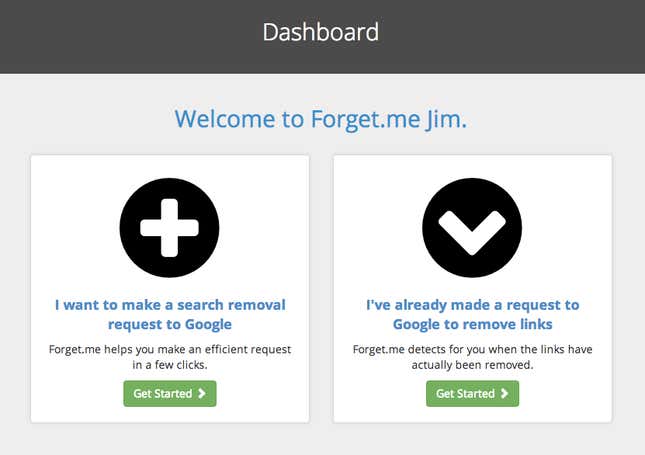
The only surprise is that it took this long. This week, the French entrepreneurs behind Reputation VIP, an online-reputation management service for “brands and VIPs,” launched Forget.me. It’s an online tool to help Europeans submit “right to be forgotten” requests to Google, in the wake of a European Court of Justice ruling (pdf) that people should be able to edit their search results to remove out-of-date or needlessly embarrassing links. The service is free for now and will remain so until the end of summer, says Bertrand Girin, a co-founder of both websites.
Girin, who is based in Lyon, says he and his co-founders had wanted to extend their services to ordinary folk for years, since “the problem of search engines is a problem for everybody. So when the European Court of Justice made its ruling, we saw that as an opportunity.” The ruling came on May 13. Google set up an online form for requesting removals on May 30. Less than a month later, Girin’s site, which uses Google’s form, is online. He says he has already had 50 forms submitted in the one day that it has been up.
Why not just submit the request directly to Google? Girin says Google’s form has shortcomings—it’s couched in legal and technical language that some people may have trouble understanding, and doesn’t always accept web addresses with non-standard characters such as Greek script or diacritics (accent marks). But these are things that Google could easily fix.
However, Forget.me also aims to make the process simpler overall. For instance, the company lists 30 case studies that offer its users canned responses to why they want a URL removed. “If someone can find a case study similar to his problem, then we can suggest a template or wording for this case and submit it to Google. And the text is written by lawyers,” says Girin. Moreover, Forget.me keeps a record of the submission in case it is needed to challenge a rejection from Google. If Google agrees, the service will also periodically check every European Google search to ensure that the link has been removed.
The service is free for the moment. Girin foresees it moving to a freemium model, where people can pay for selected extra features, by the end of the summer. He will decide which features to charge for after people have been using it for a bit. “We are certain there is a market for the right to be forgotten,” he says.



